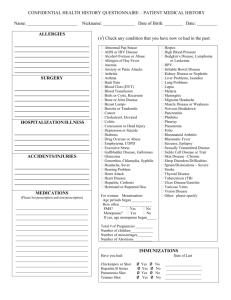MIGRAINE what you can do What are migraine headaches
advertisement
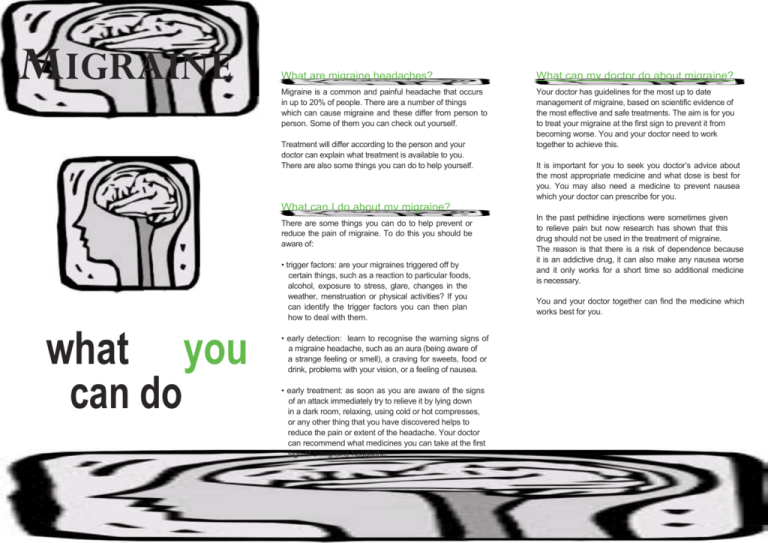
MIGRAINE What are migraine headaches? What can my doctor do about migraine? Migraine is a common and painful headache that occurs in up to 20% of people. There are a number of things which can cause migraine and these differ from person to person. Some of them you can check out yourself. Your doctor has guidelines for the most up to date management of migraine, based on scientific evidence of the most effective and safe treatments. The aim is for you to treat your migraine at the first sign to prevent it from becoming worse. You and your doctor need to work together to achieve this. Treatment will differ according to the person and your doctor can explain what treatment is available to you. There are also some things you can do to help yourself. It is important for you to seek you doctor’s advice about the most appropriate medicine and what dose is best for you. You may also need a medicine to prevent nausea which your doctor can prescribe for you. What can I do about my migraine? There are some things you can do to help prevent or reduce the pain of migraine. To do this you should be aware of: what you can do • trigger factors: are your migraines triggered off by certain things, such as a reaction to particular foods, alcohol, exposure to stress, glare, changes in the weather, menstruation or physical activities? If you can identify the trigger factors you can then plan how to deal with them. • early detection: learn to recognise the warning signs of a migraine headache, such as an aura (being aware of a strange feeling or smell), a craving for sweets, food or drink, problems with your vision, or a feeling of nausea. • early treatment: as soon as you are aware of the signs of an attack immediately try to relieve it by lying down in a dark room, relaxing, using cold or hot compresses, or any other thing that you have discovered helps to reduce the pain or extent of the headache. Your doctor can recommend what medicines you can take at the first sign of a migraine headache. In the past pethidine injections were sometimes given to relieve pain but now research has shown that this drug should not be used in the treatment of migraine. The reason is that there is a risk of dependence because it is an addictive drug, it can also make any nausea worse and it only works for a short time so additional medicine is necessary. You and your doctor together can find the medicine which works best for you. Date, day & time migraine began Length of migraine - in hours How serious was it* Possible trigger factors* Warning signs* Other problems with the migraine* Medicines taken* * e.g. could do normal activities or had to go to bed *e.g. certain foods, drink, glare, stress, weather, menstruation or activities *e.g. aura, strange sensation, sensitivity to smell, noise, light or craving *e.g. nausea, vomiting, visual disturbances,etc. * it is important to list all medicine taken - for possible interaction My pain diary Discuss with your doctor whether keeping a pain diary will help you both to understand the causes, prevention and treatment that is most helpful for you. By filling in the above diary on each occasion you get a migraine, you may see a pattern emerge that will assist you in avoiding or relieving the headaches. How well did the medicine help Any side effects of the medicine* What else relieved the migraine* *e.g. rash, vomiting, nausea, constipation e.g. lying down in the dark or using hot or cold compresses, etc. NSW THERAPEUTIC ASSESSMENT GROUP This pamphlet has been prepared by the NSW Therapeutic Assessment Group Inc to accompany the treatment guidelines prepared with a grant from the Pharmaceutical Services Branch of NSW Health.
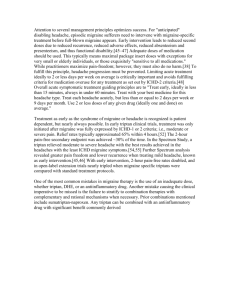
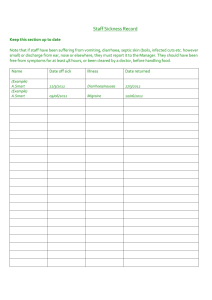
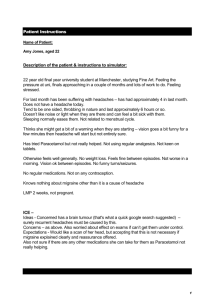
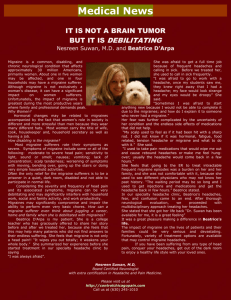
![[Plan Logo] [INSERT DATE] Dear Plan Member: Migraines can be](http://s3.studylib.net/store/data/007204786_1-1e3272ccd311201e3ba31cbff3397a69-300x300.png)

